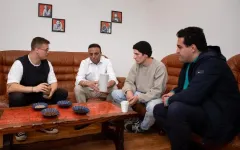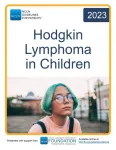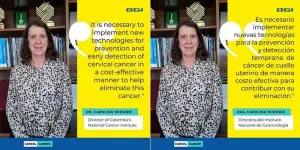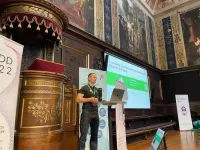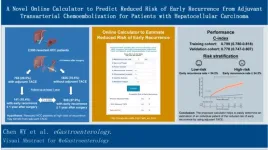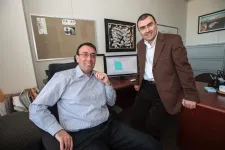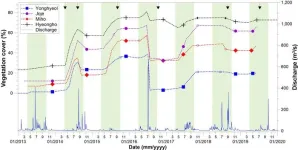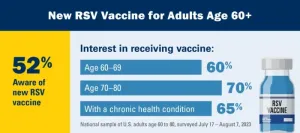(Press-News.org) Engineers in Australia have found a way of making stronger concrete with roasted used-coffee grounds, to give the drink-additive a “double shot” at life and reduce waste going to landfills.
Lead author Dr Rajeev Roychand from RMIT University said the team developed a technique to make concrete 30% stronger by turning waste coffee grounds into biochar, using a low-energy process without oxygen at 350 degrees Celsius.
“The disposal of organic waste poses an environmental challenge as it emits large amounts of greenhouse gases including methane and carbon dioxide, which contribute to climate change,” said Roychand, from the School of Engineering.
Australia generates 75 million kilograms of ground coffee waste every year – most of it goes to landfills. Globally, 10 billion kilograms of spent coffee is generated annually.
Published in the Journal of Cleaner Production, the study by RMIT engineers is the first to prove that waste coffee grounds can be used to improve concrete.
“The inspiration for our work was to find an innovative way of using the large amounts of coffee waste in construction projects rather than going to landfills – to give coffee a ‘double shot’ at life,” said Roychand, a Postdoctoral Research Fellow at RMIT.
“Several councils that are battling with the disposal of organic waste have shown interest in our work.
“They have already engaged us for their upcoming infrastructure projects incorporating pyrolysed forms of different organic wastes.”
Pyrolysis involves heating organic waste in the absence of oxygen.
The construction industry can support the recycling of waste
Joint lead author, Dr Shannon Kilmartin-Lynch, a Vice-Chancellor’s Indigenous Postdoctoral Research Fellow at RMIT, said construction industries around the world could play a role in transforming this waste into a valuable resource.
“Inspiration for my research, from an Indigenous perspective, involves Caring for Country, ensuring there’s a sustainable life cycle for all materials and avoiding things going into landfill to minimise the impact on the environment,” said Kilmartin-Lynch from RMIT’s School of Engineering.
“The concrete industry has the potential to contribute significantly to increasing the recycling of organic waste such as used coffee.
“Our research is in the early stages, but these exciting findings offer an innovative way to greatly reduce the amount of organic waste that goes to landfill.”
Preserving a precious natural resource
Corresponding author and research team leader Professor Jie Li said the coffee biochar can replace a portion of the sand that was used to make concrete.
“The ongoing extraction of natural sand around the world – typically taken from river beds and banks – to meet the rapidly growing demands of the construction industry has a big impact on the environment,” Li said.
50 billion tonnes of natural sand are used in construction projects globally every year.
“There are critical and long-lasting challenges in maintaining a sustainable supply of sand due to the finite nature of resources and the environmental impacts of sand mining,” Li said.
“With a circular-economy approach, we could keep organic waste out of landfill and also better preserve our natural resources like sand.”
Co-researcher Dr Mohammad Saberian said the construction industry needed to explore alternative raw materials to ensure its sustainability.
“Our research team has gained extensive experience in developing highly optimised biochars from different organic wastes, including wood biochar, food-waste biochar, agricultural waste biochar, and municipal solid-waste biochar, for concrete applications,” Saberian said.
What are the next steps?
The researchers plan to develop practical implementation strategies and work towards field trials. The team is keen to collaborate with various industries to develop their research.
Support for the research
The authors acknowledge the support from ARUP Australia Pty Ltd, Earth Systems Pty Ltd and RMIT University, including the Strategic Capability Deployment Fund, Rheology and Materials Characterisation Laboratory, the X-Ray Facility and the Microscopy and Microanalysis Facility.
The authors also acknowledge the Indigenous-owned coffee supplier Talwali Coffee Roasters for providing used ground coffee for the research.
Transforming spent coffee grounds into a valuable resource for the enhancement of concrete strength’ is published in the Journal of Cleaner Production. (DOI: 10.1016/j.jclepro.2023.138205).
You can link directly to the research paper: https://doi.org/10.1016/j.jclepro.2023.138205
Watch a video about the research on YouTube: https://youtu.be/28Q0xep3B4g
High-res images related to the research are available for download here: https://cloudstor.aarnet.edu.au/plus/s/Dhv6t5i09O9lcfR
RMIT co-authors are Dr Rajeev Roychand, Dr Shannon Kilmartin-Lynch, Dr Mohammad Saberian, Professor Jie Li, Professor Guomin (Kevin) Zhang and Professor Chun-Qing Li.
END
Coffee offers performance boost for concrete
2023-08-22
ELSE PRESS RELEASES FROM THIS DATE:
As city heat rises, bird diversity declines
2023-08-22
Hangzhou, China & Ithaca, N.Y.—Humans aren't the only ones leaving town when city heat becomes unbearable. A study done on 336 cities in China concludes that heat-retaining buildings and paved surfaces are directly related to a loss in bird diversity. These findings from scientists at Zhejiang University and the Cornell Lab of Ornithology are published in the journal Science of the Total Environment.
“The heat-retention characteristic of cities is a well-known phenomenon called the urban heat island ...
NCCN releases new resource to help families understand pediatric Hodgkin lymphoma, part of award-winning patient information series
2023-08-22
PLYMOUTH MEETING, PA [August 22, 2023] — The National Comprehensive Cancer Network® (NCCN®) today announced the publication of NCCN Guidelines for Patients®: Hodgkin Lymphoma in Children. The book offers a comprehensive analysis of the treatment options, benefits, and risks of care approaches for pediatric Hodgkin lymphoma, one of the most curable forms of childhood cancer, with long-term survival rates of 90% or higher.[1]
This free resource is available online at NCCN.org/patientguidelines and via the NCCN Patient Guides for Cancer App thanks to funding from the NCCN Foundation®.
“When a child is diagnosed ...
Cancel Cervical Cancer – In Conversation with Brazil, Colombia, and Uruguay Experts | BGI Insights
2023-08-22
Despite being highly preventable, the Pan American Health Organization estimates cervical cancer kills 35,700 women annually in the Americas, and 80 percent of these cases are in Latin America and the Caribbean (LAC). The recently released BGI Genomics 2023 Global State of Cervical Cancer Awareness Report reveals potential awareness gaps that may contribute to this disproportionate distribution of cervical cancer cases in these regions.
To offer greater insight into the steps needed to improve cervical ...
World’s largest aging research and drug discovery conference celebrates 10 years
2023-08-22
The Aging Research and Drug Discovery (ARDD) conference, being held at the University of Copenhagen Aug. 28-Sept. 1, is celebrating 10 years of convening top scientists, venture capitalists, business leaders, and journals engaged in aging research, medicine, and emerging technology.
The conference has grown significantly over its decade-long history. This year’s event kicks off with Longevity Medicine Day which will include speakers like Evelyne Bischof, MD, an expert in internal medicine, oncology, and longevity from Renji Hospital, Shanghai; Michael Basson, ...
A calculator to predict benefit from adjuvant transarterial chemoembolization for hepatocellular carcinoma
2023-08-22
Hepatocellular carcinoma (HCC) is the most commonly diagnosed cancer of the liver and the fourth leading cause of cancer-related mortality worldwide, with China accounting for over half of the global annual cases and deaths. Hepatectomy is the standard curative-intent treatment option for appropriately selected patients with localized HCC. However, the high postoperative recurrence rate causes many patients to have a poor prognosis and a high incidence of cancer-specific death. This occurs in especially early recurrence within the first year after surgery, which is most likely due to occult micro-metastasis from the original tumor. Given that survival among patients with recurrence is markedly ...
Paired liver exchange developed by Boston College economists results in first four-way liver exchange
2023-08-22
Chestnut Hill, Mass. (8/22/2023) – In a breakthrough in liver transplantation that may lead to the ability to connect more living donors and patients, a new matching system designed by a team led by Boston College economists enabled the world’s first four-way liver exchange and a cascade of additional matches, researchers reported recently in the American Journal of Transplantation.
The results show that expanding the capacity of the donor-patient matching mechanism beyond the traditional 2-way change – matching two patients with two donors – can increase the number of ...
Understanding river alteration via shifting flow regime
2023-08-22
Researchers at the Korea Institute of Civil Engineering and Building Technology (KICT, President Kim Byung-suk) published their findings on the drastic short-term alterations in rivers accompanied by shifts in vegetation and geomorphology drawn from actual on-site investigation and analyses and not from model simulations.
The alteration processes from a 'white river,' characterized by riverbeds with no vegetation including bare sandbars, to a densely vegetated 'green river' with grass and trees, have been ...
Want to increase resiliency in kids? Teach creativity
2023-08-22
COLUMBUS, Ohio – Train elementary school students how to be creative and you can help increase their resilience in the face of real-life problems, new research suggests.
In a small study, researchers trained third, fourth and fifth graders to use literary techniques such as perspective shifting, counter-factual (what if) thinking and causal (why) thinking to improve creativity in dealing with difficulties.
The techniques helped kids come up with new, creative and practical ways to solve problems, said Angus Fletcher, lead author of the study and a professor of English at The Ohio State University and member of the university’s Project ...
Many older adults want RSV vaccine, poll shows
2023-08-22
The first Americans over age 60 just started rolling up their sleeves to get vaccinated against respiratory syncytial virus, or RSV, now that brand-new vaccines have started to arrive at pharmacies and clinics.
Millions more older adults may do the same in coming weeks and months, a new University of Michigan poll suggests, as they seek protection against a virus that is especially good at infecting older lungs.
But nearly half of older adults do not know about the new RSV vaccines that received approval earlier this year, the poll finds. And some groups of older adults show much less interest in getting ...
New test chamber created to find better ways to keep people cool
2023-08-22
PULLMAN, Wash. — A shipping container that can test passive cooling systems could help researchers and builders find carbon-free ways to keep people cool in extreme temperatures.
Washington State University researchers created the 60 square-foot chamber to test passive systems that use wind towers along with water evaporation instead of electricity to cool spaces.
Finding cooling methods that don’t require putting more greenhouse gases into the air is crucial to helping a growing population adapt to climate change, said Omar Al-Hassawi lead author of the study in the journal, Energies.
“Cooling is ...
